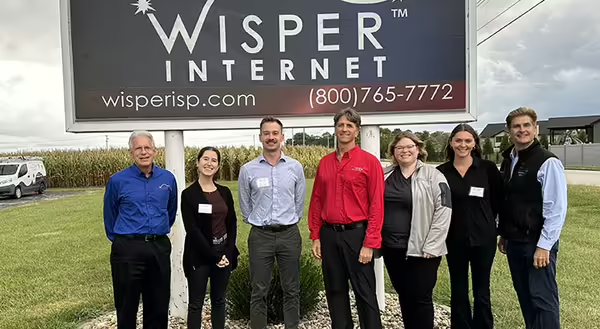
As an ISPP Scholar, Stephanie Schnaufer is appointed with the Department of Commerce and Economic Opportunity, Office of Broadband. Her work is significant as she focuses on helping to develop rules and regulations for the Dig Once Act as well as blending her background in nutrition with other projects in digital equity. Stephanie shared some thoughts about her role in the ISP program so far.
Why did you apply for the Illini Science Policy Program?
I applied to this program because I have a passion for public service and working in a collaborative space to improve communities’ quality of life. This program also offers immense mentorship and opportunities to network, which is a huge value for a newer professional like myself.
Tell us a bit about what you hope to accomplish as a result of being a 2024 Scholar.
As a result of being a policy scholar, I hope to provide a valuable, positive impact to the world of digital and health equity.
Tell us a bit about what you are working on for your host agency.
I am assisting in the development of rules and regulations for the Dig Once Act. This involves coordinating with Illinois agencies (IDOT, DoIT, ICC, IL Tollway) and other states with established policies to gather insights and summarize findings for my team's decision-making. I also support the communications team, producing content for community engagement, social media, and newsletters.
Tell us a bit about what you are working with your Extension Mentor (or what you will be doing)?
I am attending the Association of Nutrition and Foodservice Professionals Annual conference on October 17, 2024 to present on Digital Equity and Solutions to Food Insecurity. This opportunity perfectly blends my background in both nutrition and digital equity. I am also going to be collaborating on the SPICE project.
What does being in public service mean to you?
Public service means creating equity and positive change in underserved communities and demographics. As individuals we do not share the same opportunities, experiences and resources. It is the goal of policy and legislation to help create these positive changes that support equity where certain communities are lacking resources and opportunities due to systemic causes of inequity. Public service can exist within a number of spaces including personal safety, quality education, healthcare, environmental concerns, and economic growth.
What makes the work you are doing as an ISPP Scholar meaningful to you? (Please specify between you host agency work and your Extension mentor project)
Working with the Illinois Office of Broadband is deeply meaningful to me because I believe that digital access is essential in today’s society, where technology and internet connectivity are no longer luxuries but critical resources. By helping to expand broadband access, I am contributing to equitable opportunities in economic development, healthcare, and education, enabling people to improve their quality of life. Additionally, my work with the SPICE project, in collaboration with registered dietitians, is particularly rewarding as it allows me to leverage my background as a registered dietitian to address important intersections between social determinants of health and cultural competency.
What is one thing that you have learned since becoming an ISPP Scholar that has made an impression on your transition from graduate student to career individual?
Through my experience contributing to the development of the Dig Once policy, I have gained valuable insights into the intricacies of policy creation. I have learned the importance of asking the right questions, especially when starting with limited information, to ensure we arrive at the most effective solutions. Equally essential has been the development of strong relationship-building skills, as working with diverse stakeholders—sometimes with competing interests—requires balancing differing perspectives while valuing the contributions of all parties involved. This process has deepened my understanding of the collaboration and communication necessary for successful policy development.
Why is/are the issue(s) important to the communities with which you are working?
The issue of digital access is critically important to communities across Illinois because it serves as the gateway to essential resources such as healthcare, employment opportunities, education, and social participation. In today’s digital age, being connected is no longer optional—it directly impacts a community’s ability to thrive. Ensuring equitable access to the internet empowers individuals and communities to participate fully in the economy, improve their health outcomes, and access educational resources, which are all fundamental to improving their quality of life.
Who is impacted by the issue(s) you are working on?
5% of Illinois do not have access to infrastructure, 7% of Illinois does not have access to a device.
What is the most unexpected thing about this program so far?
The most unexpected aspect of this program has been the level of responsibility and involvement I’ve had in high-priority projects that directly impact the state’s digital equity plan. I never anticipated having the opportunity to engage so closely with key stakeholders or contribute to critical discussions on developing systems like the Dig Once policy. Being part of these conversations and seeing the tangible influence of my work on shaping digital infrastructure has been both surprising and incredibly rewarding.
If you could do one thing through this program and think “Wow, I did that,” what would you like it to be?
It would be being able to say that I aided in the decision making of leadership that led to positive policy changes that closed the digital divide.
Anything else you’d like to share?
I am extremely grateful for this wonderful opportunity to participate in an agency that works toward such an important cause of digital equity.
More information about the Illini Science Policy Program is available on our website. Keep reading to learn more about Stephanie's colleagues in the of 2025 ISPP Scholar Class.